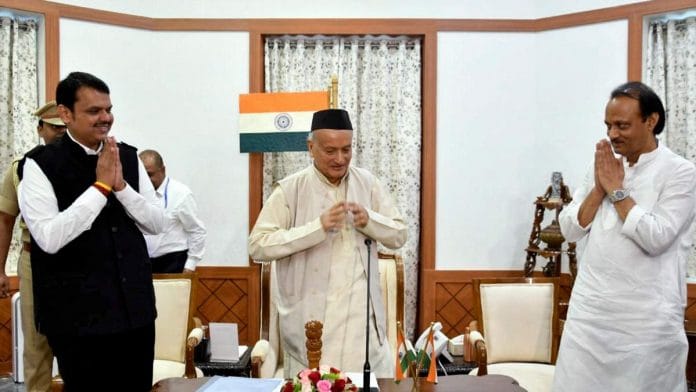New Delhi: The haste with which President’s Rule was revoked in Maharashtra in the early hours of Saturday has put the spotlight on the role of the governor and the President, with opposition leaders questioning the propriety of their actions.
Senior Congress leader Ahmed Patel called them “illegal and evil manoeuvres in the secrecy of midnight” in a tweet Saturday, while party spokesperson Randeep Surjewala tagged Governor Bhagat Singh Koshyari, calling him BJP chief Amit Shah’s “hitman”.
Many political observers have drawn parallels between Saturday’s early morning drama and what happened in 1975, when then-President Fakhruddin Ali Ahmed signed the proclamation of Emergency in the dead of night, taking recourse to Rule 12 of the Transaction of Business Rules, which allow the Prime Minister to decide without the cabinet’s approval.
But while constitutional experts question the “propriety” of President Ram Nath Kovind’s decision, they maintain there’s no illegality in the decision.
“The President can’t act independently. He can act only on the advice of the council of ministers, headed by the PM. The President has the option of sending back the proposal to the cabinet for reconsideration. However, if the cabinet reiterates its decision, the President is duty-bound to accept it,” said a constitutional expert who did not want to be identified.
Also read: Koshyari not first, governors accused of towing party line and taken to courts in past too
‘Good thing done in a questionable way’
The expert added that Saturday’s decision to revoke President’s Rule was an innocuous move, but the “problem arises when a good thing is done in a questionable way”.
An example of this came on 29 May 2014, when Kovind’s predecessor Pranab Mukherjee gave his nod for the promulgation of an ordinance that paved the way for the appointment of former TRAI chairman Nripendra Misra as principal secretary to PM Narendra Modi.
The act that formed TRAI had made Misra “ineligible” for further employment at the central or state levels, but immediately after the NDA government assumed office, it was overruled through the ordinance.
President Mukherjee’s approval came even before the NDA government completed the formality of proving its majority, though it had the requisite numbers.
Kovind himself provided an example of this on 5 November this year, when he gave his assent to the Gujarat Control of Terrorism and Organised Crime Act, a controversial anti-terror legislation that treats intercepted phone conversations as evidence in a court of law. It was passed by Gujarat’s BJP government in March 2015.
Kovind’s predecessor Mukherjee had returned the bill, raising some queries. Mukherjee was the third President to return the bill, after his predecessors Pratibha Patil and A.P.J. Abdul Kalam.
Governors’ actions under scanner
In recent years, several state governors’ actions have also come in for criticism.
A prime example of this was the situation after the Karnataka assembly elections in 2018, when then-governor Vajubhai Vala invited B.S. Yediyurappa, leader of the single largest party BJP, to form the government, without verifying how many MLAs were supporting him. The post-poll Congress-Janata Dal (Secular) alliance had more numbers.
Vala also gave the BJP 15 days to prove its majority on the floor of the house, which the Supreme Court reduced to 24 hours when the Congress knocked on its door.
The same year, then-Meghalaya governor Ganga Prasad invited National People’s Party’s Conrad Sangma to form the government with allies including the BJP, despite the Congress emerging as the single largest party.
In 2017, then-Goa governor Mridula Sinha had invited the BJP to form the government despite the Congress emerging as the single largest party.
The same year, Manipur governor Najma Heptullah had given the BJP the first chance to prove its majority, despite the Congress winning seven more seats in the 60-member assembly. The BJP eventually formed the government with the support of four MLAs each from the National People’s Party and Naga People’s Front and one MLA from the Lok Janshakti Party.
Also read: The Devendra Fadnavis-Uddhav Thackeray friendship that never really was






